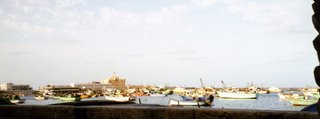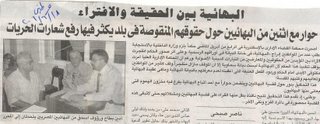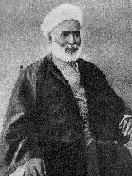Tribute to Egyptian Baha'is: National Treasure Hussein Bikar
 Mr. Hussein Amin Bikar (Bicar) was born in Egypt on 2 January 1913 near a serene fishing port named Anfoushi in the Mediterranean city of Alexandria. He was raised by a modest family that, in spite of its hardships, did its best to support his education.
Mr. Hussein Amin Bikar (Bicar) was born in Egypt on 2 January 1913 near a serene fishing port named Anfoushi in the Mediterranean city of Alexandria. He was raised by a modest family that, in spite of its hardships, did its best to support his education. After graduating from Cairo's legendary Faculty of Fine Arts in 1933, he became a teaching assistant that same year, then a Lecturer and later Director of the Photography department. He subsequently became a Professor in the Painting Department, and ultimately its Chair.
After graduating from Cairo's legendary Faculty of Fine Arts in 1933, he became a teaching assistant that same year, then a Lecturer and later Director of the Photography department. He subsequently became a Professor in the Painting Department, and ultimately its Chair.
In 1944 he began his career in journalism when he became, with Ahmad Sabri, Mustapha Amin and Ali Amin, one of the founding fathers of the prestigious Akhbar el-Youm newspaper. In 1952 he was instrumental in starting a weekly children's magazine titled SINDBAD, for which he was--along with "Sarookhan" and "Rakha"--its main cartoonist and illustrator. This magazine enjoyed huge success in Egypt and the Middle East, and was the only children's magazine in that part of the world for several years. Many children would eagerly await its arrival in train stations across the country before it got to news stands.
In 1952 he was instrumental in starting a weekly children's magazine titled SINDBAD, for which he was--along with "Sarookhan" and "Rakha"--its main cartoonist and illustrator. This magazine enjoyed huge success in Egypt and the Middle East, and was the only children's magazine in that part of the world for several years. Many children would eagerly await its arrival in train stations across the country before it got to news stands. He was also one of the founders of Cairo's Helwan Wax Museum. Over the years, Mr. Bikar had taught thousands of students at the Faculty of Fine Arts and became Egypt's most celebrated painter. His talent and artistic excellence became recognized worldwide.
He was also one of the founders of Cairo's Helwan Wax Museum. Over the years, Mr. Bikar had taught thousands of students at the Faculty of Fine Arts and became Egypt's most celebrated painter. His talent and artistic excellence became recognized worldwide. Mr. Bikar was honored with several awards including, the State Merit award in 1978, the Merit award in 1980, and culminating with the most esteemed Mubarak (Presidential) Award in June 2000. He donated the full LE 100,000 of his prize to the Children's Cancer Hospital.
Mr. Bikar was honored with several awards including, the State Merit award in 1978, the Merit award in 1980, and culminating with the most esteemed Mubarak (Presidential) Award in June 2000. He donated the full LE 100,000 of his prize to the Children's Cancer Hospital. Mr. Bikar became attracted to the Baha'i Faith in the 1930s and accepted it shortly after as his religion. He became a staunch supporter of its Institutions, and upholder of its principles. He also served on its key administrative functions. In the 1980s He was repeatedly interrogated and arrested simply because he was a Baha'i.
Mr. Bikar became attracted to the Baha'i Faith in the 1930s and accepted it shortly after as his religion. He became a staunch supporter of its Institutions, and upholder of its principles. He also served on its key administrative functions. In the 1980s He was repeatedly interrogated and arrested simply because he was a Baha'i.
In 1985 Mr. Bikar was arrested along with several other co-religionists, and released after the interference of Egypt's President, but still had to defend himself in courts until his ultimate vindication.
On one occasion in the 1990s, he was at Cairo's International Airport ready to leave on a vacation to England to visit family, when he was prevented from leaving the country with no explanation given. With great humility and acceptance, he simply turned around and went home. This one of several experiences exemplified his life, patience and unparalleled humility. Mr. Hussein Bikar lived in a modest apartment in Zamalek (a suburb of Cairo) with his wife, surrounded by some of his original paintings. He led a life of austerity and simplicity, and he was very kind to anyone who had come to associate with him.
Mr. Hussein Bikar lived in a modest apartment in Zamalek (a suburb of Cairo) with his wife, surrounded by some of his original paintings. He led a life of austerity and simplicity, and he was very kind to anyone who had come to associate with him.
In his later years, despite his fading eyesight and health problems, he continued to contribute regularly to prominent magazines. He also maintained his weekly philosophical column which was always accompanied by a relevant caricature in Egypt's official newspaper Akhbar el-Youm.
After a struggle with cancer, Mr. Hussein Bikar passed away in November 2002 shortly before his 90th birthday. The whole nation mourned his passing, and for several weeks there were daily reports in the press, radio and television regarding his persona and his exemplary contributions to Egypt's culture and heritage. He was identified as one of Egypt's National Treasures.
Mr. Bikar's life testifies to the goodness of Egyptian Baha'is who have been valuable assets to their nation. They suffered persecution for no logical reasons, but in-spite of these challenges they continued to love their country with complete loyalty. They have always promoted harmony, tolerance and acceptance. They served their fellow citizens very well, they contributed to the success of society, they nourished its culture and have been always law-abiding and exemplary citizens.



















































